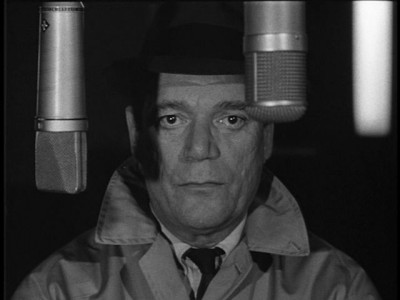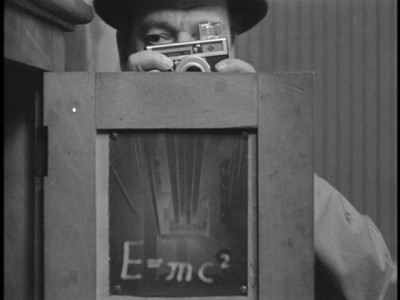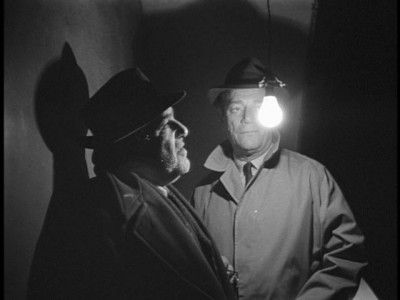
This is one of those movies I’ve heard about nigh on to forever — in fact, much further back than a lot of “art” titles because its science fiction aspect got it some exposure in the “monster magazine” Castle of Frankenstein when I was about 12, and had never even heard of Jean-Luc Godard. Yet until last week, it had never crossed my path. I can actually understand how that might have happened. I’m definitely glad I didn’t see it when I was 12. At that age, I would have dismissed it as both boring and just plain bad. In all honesty, I’m not sure that those terms don’t describe it. The difference is that I can understand now that these qualities are deliberate. I think. You see, I’m not exactly a worshipper at the altar of Godard, and I leave room for the possibility that it’s simply an inept movie — but it seems unlikely. No one — with the possible exception of certain enthusiastic Mexican horror directors of the late 1950s — could possibly slather those overly dramatic music cues all over this movie without something besides drama in mind. I have a feeling that the music is the key to the film as being more satire — or spoof, if you prefer — of the genres Godard is working in: sci-fi, spy movies, hard-boiled detective fiction and just possibly the “art” film.

The problem — or one of the problems — with arriving at a useful conclusion lies in a basic unfamiliarity of commercial French cinema of the era. Let’s face it, we mostly saw — and still mostly see — the upper tier of French movies. We rarely, if ever, see the sort of workaday movies that might help explain why the French actually like Jerry Lewis pictures. How many crummy action or detective or spy or sci-fi movies from France do we see? When Godard made this film, Eddie Constantine had been playing the lead character, Lemmy Caution, on and off for 12 years. I’ve seen none of them. I don’t think I’m sorry, but it makes it hard to know if this ridiculously stoic, trench-coated, expressionless, bargain-basement refugee from a Raymond Chandler knock-off is appreciably different from the character he usually played. (This also makes one wonder whether or not the “joke” here is on Constantine and possibly the French moviegoing public at large.) The trick is whether he’s supposed to be absurd ot not, he certainly comes across that way. And yet, there’s a kind of dumb gravity to him that’s hard to just laugh off.

There’s also a question of how seriously Godard himself takes the film’s theme of humanity becoming depersonalized and desensitized by technology — an idea that seems more pertinent now than it did then. And is Godard seriously putting forth the film’s almost Beatle-esque “all you need is love” (before the Beatles voiced that phrase) solution to the whole mess? These and lots of other questions — like just exactly how many little AG-1 flashbulbs is Caution packing in that trenchcoat so he can endlessly take pictures of…well, nothing much in particular — remain unanswered. That probably accounts for exactly why the movie still holds a certain fascination. It may mean absolutely nothing, but it’s undeniably one interesting ride — across universes in a Ford Galaxy.
Classic World Cinema by Courtyard Gallery will present Alphaville Friday, Dec. 21 at 8 p.m. at Phil Mechanic Studios, 109 Roberts St., River Arts District, upstairs in the Railroad Library). Info: 273-3332, www.ashevillecourtyard.com




Before you comment
The comments section is here to provide a platform for civil dialogue on the issues we face together as a local community. Xpress is committed to offering this platform for all voices, but when the tone of the discussion gets nasty or strays off topic, we believe many people choose not to participate. Xpress editors are determined to moderate comments to ensure a constructive interchange is maintained. All comments judged not to be in keeping with the spirit of civil discourse will be removed and repeat violators will be banned. See here for our terms of service. Thank you for being part of this effort to promote respectful discussion.